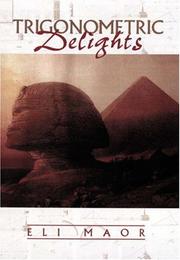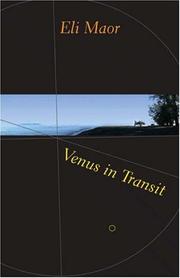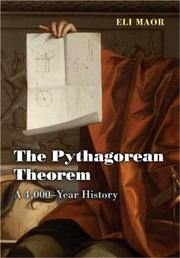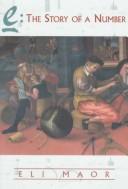| Listing 1 - 10 of 27 | << page >> |
Sort by
|
Book
Abstract | Keywords | Export | Availability | Bookmark
 Loading...
Loading...Choose an application
- Reference Manager
- EndNote
- RefWorks (Direct export to RefWorks)
Book
ISBN: 0817633251 3764333251 1461253969 1461253942 9780817633257 9783764333256 Year: 1987 Publisher: Boston: Birkhäuser,
Abstract | Keywords | Export | Availability | Bookmark
 Loading...
Loading...Choose an application
- Reference Manager
- EndNote
- RefWorks (Direct export to RefWorks)

ISBN: 0691057540 9780691057545 Year: 1998 Publisher: Princeton (N.J.): Princeton university press,
Abstract | Keywords | Export | Availability | Bookmark
 Loading...
Loading...Choose an application
- Reference Manager
- EndNote
- RefWorks (Direct export to RefWorks)
Trigonometry has always been the black sheep of mathematics. It has a reputation as a dry and difficult subject, a glorified form of geometry complicated by tedious computation. In this book, Eli Maor draws on his remarkable talents as a guide to the world of numbers to dispel that view. Rejecting the usual arid descriptions of sine, cosine, and their trigonometric relatives, he brings the subject to life in a compelling blend of history, biography, and mathematics. He presents both a survey of the main elements of trigonometry and a unique account of its vital contribution to science and social development. Woven together in a tapestry of entertaining stories, scientific curiosities, and educational insights, the book more than lives up to the title 'Trigonometric Delights.'Maor, whose previous books have demystified the concept of infinity and the unusual number "e," begins by examining the "proto-trigonometry" of the Egyptian pyramid builders. He shows how Greek astronomers developed the first true trigonometry. He traces the slow emergence of modern, analytical trigonometry, recounting its colorful origins in Renaissance Europe's quest for more accurate artillery, more precise clocks, and more pleasing musical instruments. Along the way, we see trigonometry at work in, for example, the struggle of the famous mapmaker Gerardus Mercator to represent the curved earth on a flat sheet of paperwe see how M. C. Escher used geometric progressions in his artand we learn how the toy Spirograph uses epicycles and hypocycles.Maor also sketches the lives of some of the intriguing figures who have shaped four thousand years of trigonometric history. We meet, for instance, the Renaissance scholar Regiomontanus, who is rumored to have been poisoned for insulting a colleague, and Maria Agnesi, an eighteenth-century Italian genius who gave up mathematics to work with the poor--but not before she investigated a special curve that, due to mistranslation, bears the unfortunate na
Trigonometry. --- Trigonométrie --- Trigonometry --- #WWIS:AGGR --- Geometry --- Mathematics --- goniometrie --- driehoeksmeting --- geometrie --- Trigonométrie --- Trig (Trigonometry)

ISBN: 0691048746 9780691048741 0691115893 0691225354 Year: 2000 Publisher: Princeton, N.J. : Princeton University Press,
Abstract | Keywords | Export | Availability | Bookmark
 Loading...
Loading...Choose an application
- Reference Manager
- EndNote
- RefWorks (Direct export to RefWorks)
"In 2004, Venus will cross the sun's face for the first time since 1882. Some will not bother to step outside. Others will plan for years, reserving airline tickets to see the transit in its entirety. But even this group of astronomers and experience seekers will be attracted not by scientific purpose but by the event's beauty, rarity, and perhaps - after this book - history. For previous sky-watchers, though, transits afforded the only chance to determine the all-important astronomical unit: the mean distance between earth and sun." "Eli Maor tells the intriguing tale of the five Venus transits observed by humans and the fantastic efforts made to record them. This is the story of heroes and cowards, of reputations earned and squandered, told against a backdrop of phenomenal geopolitical and scientific change. Throughout, Maor guides readers to the upcoming Venus transits in 2004 and 2012, opportunities to witness a phenomenon seen by no living person and not to be repeated until 2117"--Jacket.

ISBN: 9780691125268 0691125260 Year: 2007 Publisher: Princeton (N.J.) : Princeton university press,
Abstract | Keywords | Export | Availability | Bookmark
 Loading...
Loading...Choose an application
- Reference Manager
- EndNote
- RefWorks (Direct export to RefWorks)
By any measure, the Pythagorean theorem is the most famous statement in all of mathematics, one remembered from high school geometry class by even the most math-phobic students. Well over four hundred proofs are known to exist, including ones by a twelve-year-old Einstein, a young blind girl, Leonardo da Vinci, and a future president of the United States. Here--perhaps for the first time in English--is the full story of this famous theorem. Although attributed to Pythagoras, the theorem was known to the Babylonians more than a thousand years before him. He may have been the first to prove it, but his proof--if indeed he had one--is lost to us. Euclid immortalized it as Proposition 47 in his 'Elements', and it is from there that it has passed down to generations of students. The theorem is central to almost every branch of science, pure or applied. It has even been proposed as a means to communicate with extraterrestrial beings, if and when we discover them. And, expanded to four-dimensional space-time, it plays a pivotal role in Einstein's theory of relativity. In this book, Eli Maor brings to life many of the characters that played a role in the development of the Pythagorean theorem, providing a fascinating backdrop to perhaps our oldest enduring mathematical legacy.
Pythagorean theorem --- History. --- Pythagoras' theorem --- Pythagorean proposition --- Theorem, Pythagorean --- Geometry, Plane --- History --- Pythagore, théorème de --- Histoire

ISBN: 0691025118 9780691025117 Year: 1991 Publisher: Princeton (N.J.): Princeton university press,
Abstract | Keywords | Export | Availability | Bookmark
 Loading...
Loading...Choose an application
- Reference Manager
- EndNote
- RefWorks (Direct export to RefWorks)
Mathematics --- Infini --- Infinite --- Mathématiques --- Philosophie

ISBN: 0691033900 9780691141343 0691141347 9780691033907 Year: 1994 Publisher: Princeton (N.J.): Princeton university press,
Abstract | Keywords | Export | Availability | Bookmark
 Loading...
Loading...Choose an application
- Reference Manager
- EndNote
- RefWorks (Direct export to RefWorks)
e (The number) --- Number theory --- Napier, John --- e [The number ] --- E (The number). --- Musique. --- Music. --- Bernoulli, Johann --- Bernoulli, Jean, --- Exponential functions. --- Fonctions exponentielles. --- Bernoulli, Jakob, --- Bernoulli, Jacques --- Euler, Leonhard --- Euler, Leonhard, --- Logarithms. --- Logarithmes. --- Fonctions exponentielles --- Histoire des mathematiques --- E (le nombre) --- Musique --- Theorie --- 18e siecle
Book
ISBN: 9781400889891 1400889898 9780691176901 0691176906 Year: 2018 Publisher: Princeton, NJ : Princeton University Press,
Abstract | Keywords | Export | Availability | Bookmark
 Loading...
Loading...Choose an application
- Reference Manager
- EndNote
- RefWorks (Direct export to RefWorks)
How music has influenced mathematics, physics, and astronomy from ancient Greece to the twentieth centuryMusic is filled with mathematical elements, the works of Bach are often said to possess a math-like logic, and Igor Stravinsky said "musical form is close to mathematics," while Arnold Schoenberg, Iannis Xenakis, and Karlheinz Stockhausen went further, writing music explicitly based on mathematical principles. Yet Eli Maor argues that music has influenced math at least as much as math has influenced music. Starting with Pythagoras, proceeding through the work of Schoenberg, and ending with contemporary string theory, Music by the Numbers tells a fascinating story of composers, scientists, inventors, and eccentrics who played a role in the age-old relationship between music, mathematics, and the sciences, especially physics and astronomy. Music by the Numbers explores key moments in this history, particularly how problems originating in music have inspired mathematicians for centuries. Perhaps the most famous of these problems is the vibrating string, which pitted some of the greatest mathematicians of the eighteenth century against each other in a debate that lasted more than fifty years and that eventually led to the development of post-calculus mathematics. Other highlights in the book include a comparison between meter in music and metric in geometry, complete with examples of rhythmic patterns from Bach to Stravinsky, and an exploration of a suggestive twentieth-century development: the nearly simultaneous emergence of Einstein's theory of relativity and Schoenberg's twelve-tone system.Weaving these compelling historical episodes with Maor's personal reflections as a mathematician and lover of classical music, Music by the Numbers will delight anyone who loves mathematics and music.
MUSIC / Instruction & Study / Theory. --- Music --- Acoustics and physics. --- Mathematics. --- Musical acoustics --- Physics --- Sound --- Monochord

ISBN: 0691168482 1283379872 9786613379870 1400832349 9781400832347 9781283379878 9780691141343 0691141347 0691033900 9780691033907 0691058547 9780691058542 9780691168487 Year: 2011 Publisher: Princeton, NJ : Princeton University Press,
Abstract | Keywords | Export | Availability | Bookmark
 Loading...
Loading...Choose an application
- Reference Manager
- EndNote
- RefWorks (Direct export to RefWorks)
The interest earned on a bank account, the arrangement of seeds in a sunflower, and the shape of the Gateway Arch in St. Louis are all intimately connected with the mysterious number e. In this informal and engaging history, Eli Maor portrays the curious characters and the elegant mathematics that lie behind the number. Designed for a reader with only a modest mathematical background, this biography brings out the central importance of e to mathematics and illuminates a golden era in the age of science.
e (The number) --- Napier number --- Number, Napier --- Logarithmic functions --- Transcendental numbers
Book
ISBN: 0691199493 Year: 2019 Publisher: Princeton, NJ : Princeton University Press,
Abstract | Keywords | Export | Availability | Bookmark
 Loading...
Loading...Choose an application
- Reference Manager
- EndNote
- RefWorks (Direct export to RefWorks)
An exploration of one of the most celebrated and well-known theorems in mathematicsBy any measure, the Pythagorean theorem is the most famous statement in all of mathematics. In this book, Eli Maor reveals the full story of this ubiquitous geometric theorem. Although attributed to Pythagoras, the theorem was known to the Babylonians more than a thousand years earlier. Pythagoras may have been the first to prove it, but his proof-if indeed he had one-is lost to us. The theorem itself, however, is central to almost every branch of science, pure or applied. Maor brings to life many of the characters that played a role in its history, providing a fascinating backdrop to perhaps our oldest enduring mathematical legacy.
Pythagorean theorem --- Pythagoras' theorem --- Pythagorean proposition --- Theorem, Pythagorean --- Geometry, Plane --- History.
| Listing 1 - 10 of 27 | << page >> |
Sort by
|

 Search
Search Feedback
Feedback About UniCat
About UniCat  Help
Help News
News